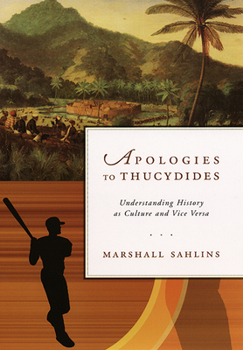Apologies to Thucydides: Understanding History as Culture and Vice Versa
Select Format
Select Condition 
Book Overview
Thucydides' classic work on the history of the Peloponnesian War is the root of Western conceptions of history--including the idea that Western history is the foundation of everyone else's. Here, Marshall Sahlins takes on Thucydides and the conceptions of history he wrought with a groundbreaking new book that shows what a difference an anthropological concept of culture can make to the writing of history. Sahlins begins by confronting Thucydides' account of the Peloponnesian War with an analogous "Polynesian War," the fight for the domination of the Fiji Islands (1843-55) between a great sea power (like Athens) and a great land power (like Sparta). Sahlins draws parallels between the conflicts with an eye to their respective systems of power and sovereignty as well as to Thucydides' alternation between individual (Pericles, Themistocles) and collective (the Athenians, the Spartans) actors in the making of history. Characteristic of most histories ever written, this alternation between the agency of "Great Men" and collective entities leads Sahlins to a series of incisive analyses ranging in subject matter from Bobby Thomson's "shot heard round the world" for the 1951 Giants to the history-making of Napoleon and certain divine kings to the brouhaha over Eli n Gonzalez. Finally, again departing from Thucydides, Sahlins considers the relationship between cultural order and historical contingency through the recounting of a certain royal assassination that changed the course of Fijian history, a story of fratricide and war worthy of Shakespeare. In this most convincing presentation yet of his influential theory of culture, Sahlins experiments with techniques for mixing rich narrative with cultural explication in the hope of doing justice at once to the actions of persons and the customs of people. And he demonstrates the necessity of taking culture into account in the creation of history--with apologies to Thucydides, who too often did not.
Format:Hardcover
Language:English
ISBN:0226734005
ISBN13:9780226734002
Release Date:December 2004
Publisher:University of Chicago Press
Length:320 Pages
Weight:1.64 lbs.
Dimensions:1.2" x 6.4" x 9.4"
Customer Reviews
1 rating
Interesting but heavy on jargon
Published by Thriftbooks.com User , 19 years ago
Marshall Sahlins uses two seemingly unrelated episodes in history to question the narrative form of historiography with which we all grew up. He compares the Peloponnesian War between Athens and Greece with the nineteenth century conflict between Rewa and Bau, two Fijian kingdoms. Both featured an expansive, sea-going empire versus a more insular, land-oriented opponent. Sahlins makes a very good case for the conflicts being driven by geography and culture, more than great men. He uses the two wars to illustrate the differences between narrative history and the more modern cultural view. He even recounts the 1951 National League pennant race between the Dodgers and the Giants to illustrate his point. Although I prefer narrative history, with its seeming movers and shakers, and its chronological descriptions of events. I have to admit that Sahlins makes very good points for "Understanding History as Culture and Vice Versa" as he subtitled this book. My only real complaint, and this extends to most works of this genre, is its intensive use of sociological jargon. Some sentences are simply unintelligible to a sociologically untrained, but otherwise literate reader. That said, this is a good read, and certainly expanded my horizons.






